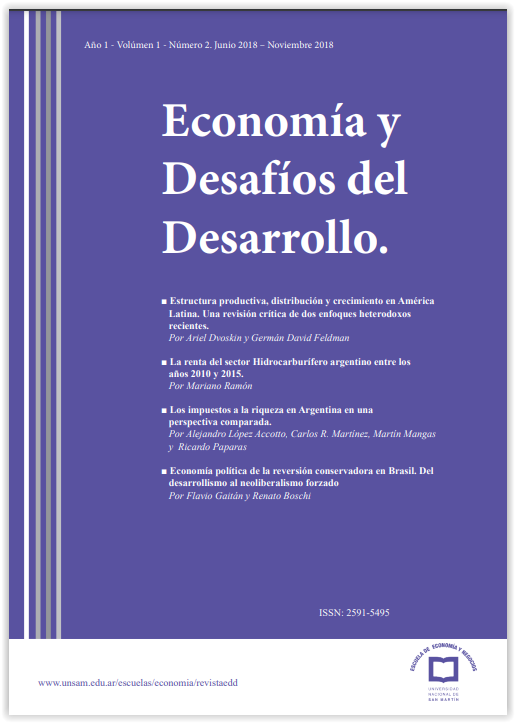Estructura productiva, distribución y crecimiento en América Latina.
Una revisión crítica de dos enfoques heterodoxos recientes.
Palabras clave:
conflicto distributivo, neo-estructuralismo, neo-desarrollismo, tipo de cambio, crecimiento económicoResumen
El presente trabajo desarrolla un marco analítico para examinar críticamente dos enfoques teóricos recientes, cuyas conclusiones y prescripciones de política económica para los países latinoamericanos dependen de manera sustancial del tipo de configuración productiva vigente: el neo-estructuralismo y el neo-desarrollismo. Se argumenta que: a) Si bien cada visión asume un patrón de especialización diferente, ambas parten de considerar que las condiciones técnicas vigentes constituyen un dato puramente técnico de las economías bajo análisis, que no es susceptible de ser modificado por cambios en las condiciones que regulan la distribución del ingreso; b) Los regímenes de crecimiento adoptados por estas posiciones son válidos únicamente bajo condiciones muy restrictivas, resultando en general inadecuados a la hora de explorar la problemática del desarrollo en las economías periféricas latinoamericanas. En vista de ello, se advierten los potenciales riesgos de utilizar la política cambiaria –instrumento clave de ambos enfoques- como herramienta fundamental para impulsar el desarrollo.
Citas
Bhaduri, A. y S. Marglin (1990), “Unemployment and the Real Wage: The Economic Basis for Contesting Political Ideologies”, Cambridge Journal of Economics, 14, pp. 375-93.
Bielschowsky, R. (2009), “Sesenta años de la cepal: estructuralismo y neoestructuralismo”, Revista CEPAL, Vol. 97, Abril, pp. 173-194.
Blecker, R. (1989), “International Competition, Income Distribution and Economic Growth,” Cambridge Journal of Economics, 13(3), pp. 395-412.
Bresser Pereira, Luiz Carlos (2008), “The Dutch desease and its neturalization: a Ricardian approach”; Brasilian Journal of Political Economy, Vol. 28(1): 47-71.
Bresser Pereira, Luiz Carlos (2012), “Summing Up Structuralist Development Macroeconomics and New Developmentalism”, Challenge, Vol. 55 (5): 59-78.
Bresser Pereira, Luiz Carlos (2016), “Reflecting on New Developmentalism and Classical Developmentalism”, Review of Keynesian Economics, Vol. 4(3): 331–352.
Bresser Pereira, Luiz Carlos; Oreiro, Jose Luis; Marconi, Nelson (2014), “A Theoretical Framework for New Developmentalism”, in L. C. Bresser Pereira, Jan Kregel and Leonardo Burlamaqui (eds.), Financial Stability and Growth London: Routledge: 55-73.
Cesaratto, S. (2015), "Neo-Kaleckian and Sraffian controversies on the theory of accumulation". Review of Political Economy, 27(2), pp. 154-182.
Damill, M; Frenkel, R (2017), “Symposium: Dilemmas of exchange rate and monetary policies in Latin America”; Journal of Post Keynesian Economics, DOI: 10.1080/01603477.2017.1343079
Dvoskin, A.; Feldman, G. (2015), “Política cambiaria, distribución del ingreso y estructura productiva”, en A. Bárcena, A. Prado y M. Abeles (eds.), Estructura productiva y política macroeconómica. Enfoques heterodoxos desde América Latina. Santiago: CEPAL.
Dvoskin, A.; Feldman, G. (2017a), “Income Distribution and the Balance of Payments. A Formal Reconstruction of Some Argentinian Structuralist Contributions. Part I: Technical Dependency”, Review of Keynesian Economics (próximamente).
Dvoskin, A.; Feldman, G. (2017b), “Income Distribution and the Balance of Payments. A Formal Reconstruction of Some Argentinian Structuralist Contributions. Part II: Financial Dependency”, Review of Keynesian Economics (próximamente).
Dvoskin, A.; Feldman, G. (2018), “A Formal Assessment of New-Developmentalist Theory and Policy”, Brazilian Journal of Political Economy (próximamente).
Dvoskin, A.; Feldman, G.; Ianni, G. (2018), “New-Structuralist Exchange-Rate Policy and the Pattern of Specialization in Latin American Countries”, Centro Sraffa Working Papers, No 28. Febrero
Frenkel, Roberto (2004), “Real exchange rate and employment in Argentina, Brazil, Chile and Mexico”, Iktisat Isletme ve Finans vol. 19, issue 223: 29-52.
Frenkel, R.; Ros, J. (2006), “Unemployment and the Real Exchange Rate in Latin America”, World Development Vol. 34(4), pp. 631–646.
Kurz, H.; Salvadori, N. (1995), Theory of Production. Cambridge: Cambridge University Press.
Lavoie, M. (1996), “Traverse, Hysteresis, and Normal Rates of Capacity Utilization in Kaleckian Models of Growth and Distribution”, Review of Radical Political Economics, vol. 28(4), pp. 113-147.
Lavoie, M. (2001), “The reflux mechanism in the open economy”, in L.P. Rochon and M. Vernengo (eds.), Credit, Growth and the Open Economy: Essays in the Horizontalist Tradition. Cheltenham: Edward Elgar.
Martins Neto, A.; Tadeu Lima, G. (2016), “Competitive Exchange Rate and Public Infraestructure in a Macrodynamic of Economic Growth”, Metroeconomica (forthcoming). DOI: 10.1111/meca.12143.
Oreiro, J. L; Missio, F.; Jayme Jr., F. (2015), “Capital Accumulation, Structural Change and Real Exchange Rate in a Keynesian-Structuralist Growth Model”, Panoeconomicus, Vol. 62(2), pp. 237-256.
Pariboni, R. (2016), “Autonomous demand and the Marglin–Bhaduri model: a critical note”, Review of Keynesian Economics, Vol. 4(4), pp. 409–428.
Rapetti, M. (2013), “Macroeconomic Policy Coordination in a Competitive Real Exchange Rate Strategy for Development”, Journal of Globalization and Development, De Gruyter, vol. 3(2), pp. 1-31.
Rapetti, M. (2016), “The Real Exchange Rate and Economic Growth: Some Observations on the Possible Channels”, in Damill M., M. Rapetti and G. Rozenwurcel (eds.) Macroeconomics and Development: Roberto Frenkel and the Economics of Latin
America. New York: Columbia University Press, pp. 250-268.
Razmi, A. (2007), “The Contractionary Short-Run Effects of Nominal Devaluation in Developing Countries: some Neglected Nuances”, International Review of Applied Economics, Vol. 21(5), pp. 577-602.
Razmi, A.; Rapetti, M; Skott, P. (2012), “The Real Exchange Rate and Economic Development”, Structural Change and Economic Dynamics, 23(2), pp. 151–169.
Rodrik, D. (2008), “The real exchange rate and economic growth”, Brookings Papers on Economic Activity 39(2), pp. 365–439.
Ros, J. (2016), “The Real Exchange Rate, the Real Wage, and Growth: A Formal Analysis of the “Development Channel”, in Damill M., M. Rapetti and G. Rozenwurcel (eds.)
Macroeconomics and Development: Roberto Frenkel and the Economics of Latin America. New York: Columbia University Press, pp. 229-249.
Ros, J.; Skott, P. (1998), “Dynamic effects of trade liberalization and currency overvaluation under conditions of increasing returns”, The Manchester School; Vol. 66(4), pp.466-489.



